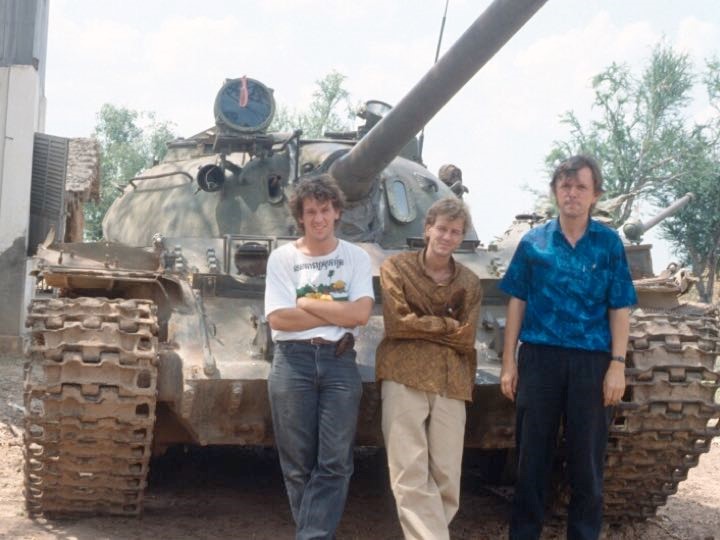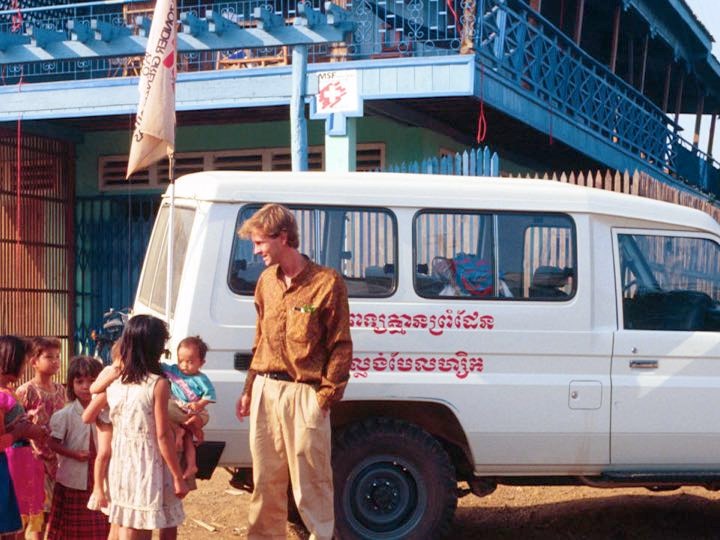
Behind the headlines: When conflict escalates, infectious diseases thrive

Richard Heinzl (center) went to Sisophon, Cambodia, on his first mission with MSF in 1991.
Editor’s Note: The contents of this blog, unfortunately, remain relevant as conflict continues to occur in many regions of the world. Although the context was originally published in 2016, the DefeatDD team recognizes the relevance of this message in 2024, as we witness tragedy in Gaza, Ukraine, and other regions.
I used to work in some of the poorest places in the world with Doctors Without Borders. The local people were wonderful and intelligent but poor because they were immersed in war and other forms of violence. The places they lived in were terribly insecure. War, even a little bit of it, wreaks havoc on the infrastructure of a society. The things that we take for granted in the rich parts of the world all fall apart. If a power generating station is broken, there’s no electricity. And when there’s no electricity, water purification systems don’t work. Diarrhea pathogens like Shigella and ETEC love these conditions. They thrive. People drink contaminated water because they have no choice. They naturally become sick, especially the kids. I’ve seen it a thousand times.
All of this happens rather silently. These kinds of war-related problems don’t go off with a bang. You don’t see it on the evening news. I often say that it’s not the bombs and bullets in war that hurt the most people, it’s the invisible microbes that thrive in broken cities affected by war that hurt the most people. Let me say the obvious: War is bad for your health.

The other problem about war and violence is that as soon as it happens, those who have the means, the professionals and their families do what any of us would do: they leave. They’re the ones with cars and enough money to do so. They’re gone in a hurry. I’m talking about doctors and nurses and all of the important healthcare professionals who run clinics and hospitals. So now all of the people and systems meant to help people who get sick have all left. No one is there to help. The infections start taking an enormous toll. Intestinal disease runs rampant.
I guess the greatest thing we could do is prevent war and violence. I know that’s a bit utopian. But I learned about something that was anything but utopian recently at the Vaccines Against Shigella and ETEC (VASE) Conference in Washington: I learned about the possibility of vaccines and other successful treatments. I had the tremendous privilege of addressing the delegates there this past June. My very high opinion of the people attending this conference got even higher after I met them personally and learned how sincerely dedicated they are to the kinds of issues I’m writing about in this blog. They are heroes of mine because they are working on finding solutions to some of the most important and difficult problems in the world, problems that don’t often make the headlines. In fact, these problems almost never make the headlines and yet they are a burden to humanity on the same level as their more famous cousins such as tuberculosis, malaria, and HIV.
And while I say that preventing war is a utopian idea, one that we may never realize, developing vaccines against Shigella and ETEC is a very real near-term possibility and one that should be supported in all ways. Having been on the frontlines, tending to very real patients who have these maladies, I know how crucial it is to find solutions. And that is why I would like to lend my voice in support of people everywhere who are trying to bring an end to these tremendous problems confronting human health.
Photo credits: Richard Heinzl.


